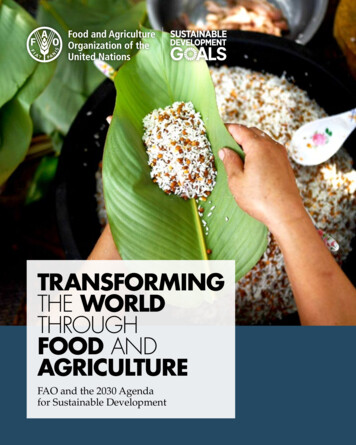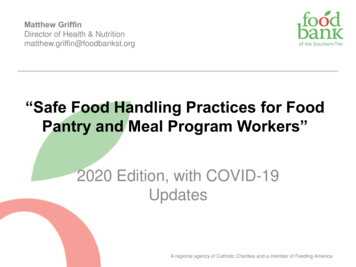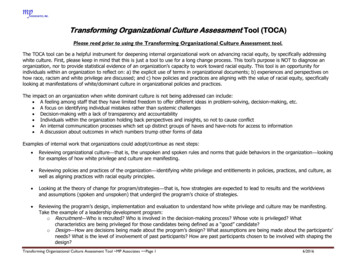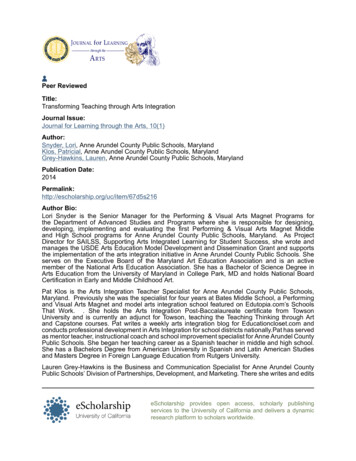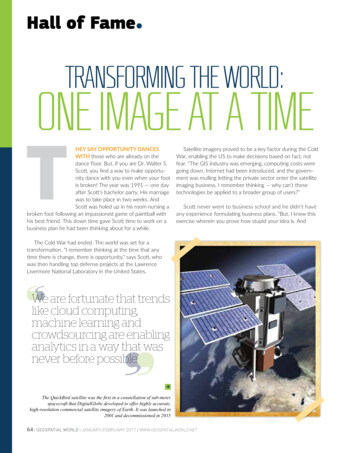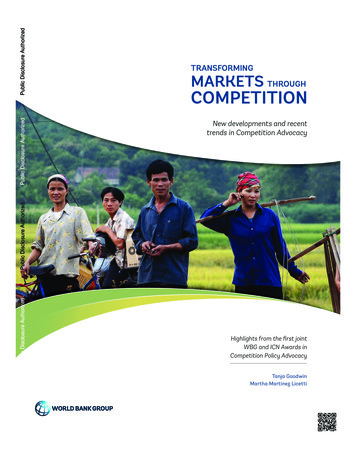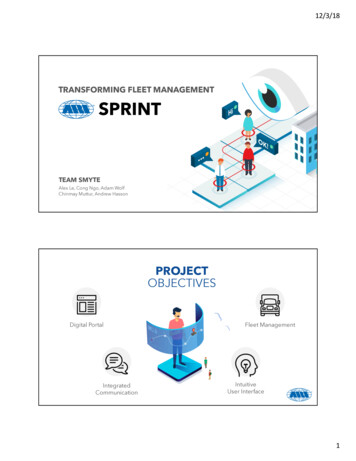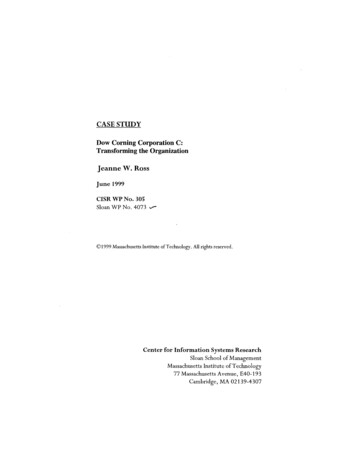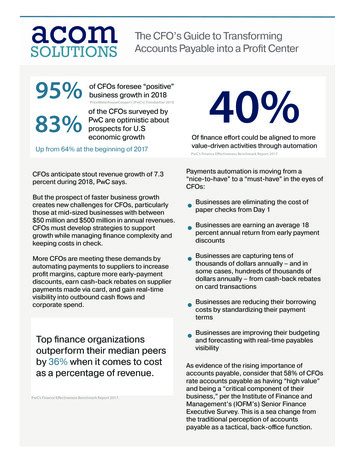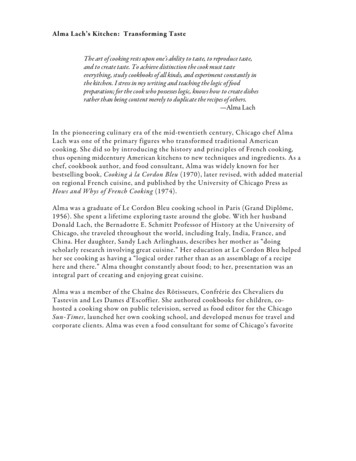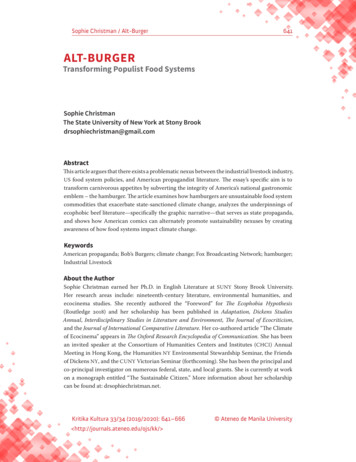
Transcription
Sophie Christman / Alt-Burger 641ALT-BURGERTransforming Populist Food SystemsSophie ChristmanThe State University of New York at Stony Brookdrsophiechristman@gmail.comAbstractThis article argues that there exists a problematic nexus between the industrial livestock industry,US food system policies, and American propagandist literature. The essay’s specific aim is totransform carnivorous appetites by subverting the integrity of America’s national gastronomicemblem – the hamburger. The article examines how hamburgers are unsustainable food systemcommodities that exacerbate state-sanctioned climate change, analyzes the underpinnings ofecophobic beef literature—specifically the graphic narrative—that serves as state propaganda,and shows how American comics can alternately promote sustainability nexuses by creatingawareness of how food systems impact climate change.KeywordsAmerican propaganda; Bob’s Burgers; climate change; Fox Broadcasting Network; hamburger;Industrial LivestockAbout the AuthorSophie Christman earned her Ph.D. in English Literature at SUNY Stony Brook University.Her research areas include: nineteenth-century literature, environmental humanities, andecocinema studies. She recently authored the “Foreword” for The Ecophobia Hypothesis(Routledge 2018) and her scholarship has been published in Adaptation, Dickens StudiesAnnual, Interdisciplinary Studies in Literature and Environment, The Journal of Ecocriticism,and the Journal of International Comparative Literature. Her co-authored article “The Climateof Ecocinema” appears in The Oxford Research Encyclopedia of Communication. She has beenan invited speaker at the Consortium of Humanities Centers and Institutes (CHCI ) AnnualMeeting in Hong Kong, the Humanities NY Environmental Stewardship Seminar, the Friendsof Dickens NY , and the CUNY Victorian Seminar (forthcoming). She has been the principal andco-principal investigator on numerous federal, state, and local grants. She is currently at workon a monograph entitled “The Sustainable Citizen.” More information about her scholarshipcan be found at: drsophiechristman.net.Kritika Kultura 33/34 (2019/2020): 641–666 http://journals.ateneo.edu/ojs/kk/ Ateneo de Manila University
Sophie Christman / Alt-Burger 642Long before the twenty-first century preoccupation with climate change,Shakespeare registered the negative effects of humanity’s carnivorous appetiteswhen, in Twelfth Night, Sir Andrew Aguecheek admits his overconsuming ways toToby Belch: Aguecheek admits “I am a great eater of beef and I believe that doesharm to my wit” (Act I, Scene 3). Even in Shakespeare’s fifteenth-century magicalland of Illyria, the febrile Aguecheek—a character who is generally regarded as adunce—was mindful to the negative effects of eating too much meat.Shakespeare’s folly on elite gastronomic appetites is, ironically, an amusementthat is nowadays encoded in tragedy since today’s global food systems exacerbateclimate change through their exploitation of industrial livestock. While Aguecheek’sepiphany in Twelfth Night acknowledged that his unrestrained appetite for meatspawned a dim wit, modern science has lately proven that beef-eating people arebad for the planet; in short, we humans must transform our gustatory appetites fornon-human animals—particularly beef—in order to combat climate change in theAnthropocene.Food studies’ scholars in this special volume of Kritika Kultura have doneimportant work theorizing how gastronomic discourses are entangled in canonicliterary narratives. This article enhances those conversations by exploring whatscholars might consider as literature’s less sophisticated and undervalued populistcultural products.1 “Alt-Burger” utilizes cultural criticism and literary case studiesto argue that there exists a problematic nexus between the industrial livestockindustry, US food system policies, and American propagandist literature. In thisessay, my specific aim is to transform carnivorous appetites by subverting theintegrity of America’s national gastronomic emblem – the hamburger. To worktowards the normalization of alternative non-beef burgers, the article examinesthe ways in which beef hamburgers can be dubbed as unsustainable foodsystem commodities that hasten state-sanctioned climate change; I evidencehow hamburgers are proven instigators of global warming, and how the US beefindustry intersects with and receives substantial support from US farm and exportpolicies. I then analyze the ecophobic underpinnings of beef literature that functionas propaganda for state policies. I show how the graphic narrative—the comicbook—targets mass audiences to destabilize emerging sustainability discourses inresponse to neoliberal governmental food policies. I argue that graphic narratives,such as the American comic book series Bob’s Burgers, are serviceable to popularculture in authorizing nationalist modes of ecophobia;2 the article concludes byacknowledging that although comics can act as apparati to the state, they can alsopromote sustainability nexuses by creating awareness of what Ann Kaplan and Ihave recently termed as “climate change populism” (“The Climate of Ecocinema”3). Climate change populism is defined as a “global social condition where ordinarypeople embody and act on an emerging awareness of the destructive humanKritika Kultura 33/34 (2019/2020): 642–666 http://journals.ateneo.edu/ojs/kk/ Ateneo de Manila University
Sophie Christman / Alt-Burger 643behaviors that cause climate change,” an example of which is a consumer’s decisionto reduce or eliminate carnivority in the diet (“The Climate of Ecocinema” 3). Todemonstrate the cultural value of popular climate change comics, the article claimsthat Chris Madden’s cartoons in The Beast that Ate the Earth can promote bothstewardship and transformational alternatives to beef food systems by ignitingcognitive realignments that spur the mass behaviour changes needed to reduceglobal warming.Hamburgers promote climate change; the American hamburger arrived fromWestern Europe in a mid-nineteenth century Westward Ho! moment when the“economic, geographic, and industrial factors combined to favour cow flesh overpig flesh and to deliver this cow flesh to growing markets” (Adams, Burger 5). Onehundred and fifty years later, US corporate megaliths have systematized the massindustrialization of bovine bodies sanctioned through infrastructures of corporatecapitalism that target the working classes; national corporations such as BurgerKing, McDonald’s, Wendy’s, and White Castle have secured the beef patty asan American institution, where 48 billion burgers are eaten in the United Statesevery year (Barksdale, “Hamburger Helpers: The History of America’s FavoriteSandwich”).The average American, according to The Hidden Cost of Hamburgers, eatsthree burgers per week, or one hundred and fifty-six burgers each year; this beefconsumption shows that Americans consume three times more meat than peoplein other countries—a statistic that, in terms of greenhouse gas emissions, suggeststhe global need for Americans to shift their disproportionate overconsumption ofbeef. As an industrialized nation, America has led an unsustainable global trendtowards the Western-style diet, that is, according to Janet Ranganathan, et al, “highin calories, protein, and animal-based foods” (1). In “Shifting Diets for a SustainableFood Future,” Ranganathan’s global socioeconomic perspective notes that at least 3 billion people are expected to join the global middle class by 2030. Asnations urbanize and citizens become wealthier, people generally increase their calorieintake and the share of resource-intensive foods—such as meats and dairy—in theirdiets.” (1)As Simon C. Estok has shown in The Ecophobia Hypothesis, “the very concept ofthe fully industrialized nation has at its core an ethics of meat” (92). The practiceof meat-eating is a normalized form of ecophobia. Ecophobia, argues Estok, existson a spectrum and can embody fear, contempt, indifference, or lack of mindfulness(or some combination of these) towards the natural environment. While its geneticorigins have functioned, in part, to preserve our species, the ecophobic condition hasKritika Kultura 33/34 (2019/2020): 643–666 http://journals.ateneo.edu/ojs/kk/ Ateneo de Manila University
Sophie Christman / Alt-Burger 644also greatly serviced growth economies and ideological interests. Often a product ofbehaviors serviceable in the past but destructive in the present it is also sometimes aproduct of the perceived requirements of our seemingly exponential growth. (1)In the carbon economies of the twenty-first century, ecophobia has becomea systematized, invisible appendage to the American human condition. AsEstok reminds us, ecophobia embodies modes of “contempt” and “indifference,”particularly in societal food systems that exploit non-human, unenfranchisedanimals at the expense of planetary health. Estok is correct in arguing that “meatrepresents the ecophobic condition at its most global extreme because of theabsolute nonchalance toward nature’s non-human bodies that are desecrated in theindustrial-meat industry” (92). Since ecophobia is due, in large part, to neoliberalgrowth economies that target mass market consumers, it is fruitful to study theways in which mass market literature impacts food systems by exploiting nonhuman animals within the twenty-first century’s food holocausts. Today there is aglobal urgency to recalibrate unsustainable food systems by challenging the humanaffinity for beef in order to curb global warming. “As consumers,” Darra Goldsteinexplains, “we’ve become increasingly sophisticated about what we eat but we alsoneed to become more articulate about our food to be aware of its sources and uses,and not merely on a culinary level” (iv). More than just a culinary process, food actsas a cultural force in American society.In her chapter “Citizen Burger,” Adams reminds us of the civic lineage of theterm: “Burgher: citizen of the city” (1). Deploying a metonymic leap to conflatecitizenship with the beloved hamburger, she goes on to note that the Americanbeef patty “is the citizen’s economic food choice, the everyman’s lowest commondenominator” (emph. mine 1). Adams’ rationalization indicates that inherent inAmerican patriotism there exists a personal pledge to its iconic emblems such asthe nation’s flag and its national bird symbol, the bald eagle. In addition to the waysin which citizens ascribe to these emblems, one’s patriotism is largely performedthrough participation in the US economy—specifically through consumption ofsymbolic national foods such as apple pie, hot dogs, and hamburgers.American citizens are strategically groomed to participate in a type ofprivileged US corporate capitalism based on consuming the flesh of non-humananimals—whose species’ status has heretofore excluded them from the rights ofcitizenship—and who are bred specifically for human gustatory consumption.3Today’s citizens of the Anthropocene must become cognizant of end climate timesand work towards global modes of sustainable citizenship. Whether enfranchisedas individual citizens or corporate ones, citizens in a growing number of nationsare legislated rights to a healthy planet. Along with these rights, citizens must alsoextend a responsible duty of care over the earth’s environment.4Kritika Kultura 33/34 (2019/2020): 644–666 http://journals.ateneo.edu/ojs/kk/ Ateneo de Manila University
Sophie Christman / Alt-Burger 645Since its corporate beginnings in 1955, McDonalds has posed as a promoterof literacy in order to indoctrinate children towards carnivority. The company’smost recent corporate manoeuvre includes expanding its Happy Meal brand intoliterary and online platforms that target children. To launch their new literaryplatform, McDonalds US recently joined forces with HarperCollins Publishers tooffer selected children’s books as part of Happy Meals. In 2017, to capitalize onAmerica’s National Literacy Month that occurs each September, Harper includeda free miniature-sized book, including Amelia Bedelia’s First Day of School and IfYou Take a Mouse to School in each Happy Meal. The rationale, according to thepublisher’s website, is to “help make book ownership more accessible to children.”This corporate marketing strategy, while admittedly encouraging education throughaccess to reading, promotes the unsustainability of US food systems by targetingcarnivority to America’s poorest consumers.To bolster the Happy Meal brand on a digital platform, the new Happy Mealtoys contain additional surprises when children scan them using digital devices.The “surprises” include online videos, drawing apps, play activities, and links to theHappy Meal website that urge children to think of Happymeal.com as an online version of everything you love about theHappy Meal. It’s always fun and full of positive, empowering messages . It also promotesactive lifestyles and balanced eating choices, such as apple slices and low-fat dairy withawesome music videos, games and other activities. (“Spark Imagination and CreativityThrough Play!”)Urging child consumers to overlook the ways in which flesh economics areunsustainable, the company markets its kids’ meals as value-added throughthe company’s digital enhancements.5 Both the literature and digital productsproduced by McDonald’s to target child consumers wholly ignore the problem ofsustainability.This type of methodical consumer grooming in the American burger industryshares similarities with the pederastic grooming practices of child sexual predators.Child sexual predators groom children for exploitation by first targeting them,then gaining their trust, and oftentimes isolating the victim to access and exploitthe child. In a somewhat similar fashion, McDonald’s uniquely targets each childwith its “Happy Meal” brand, gains the child’s trust with both a toy and the quirkymascot clown Ronald McDonald, and even isol
such as the American comic book series Bob’s Burgers, are serviceable to popular culture in authorizing nationalist modes of ecophobia;2 the article concludes by acknowledging that although comics can act as apparati to the state, they can also promote sustainability nexuses by creating awareness of what Ann Kaplan and I have recently termed as “climate change populism” (“The Climate .
